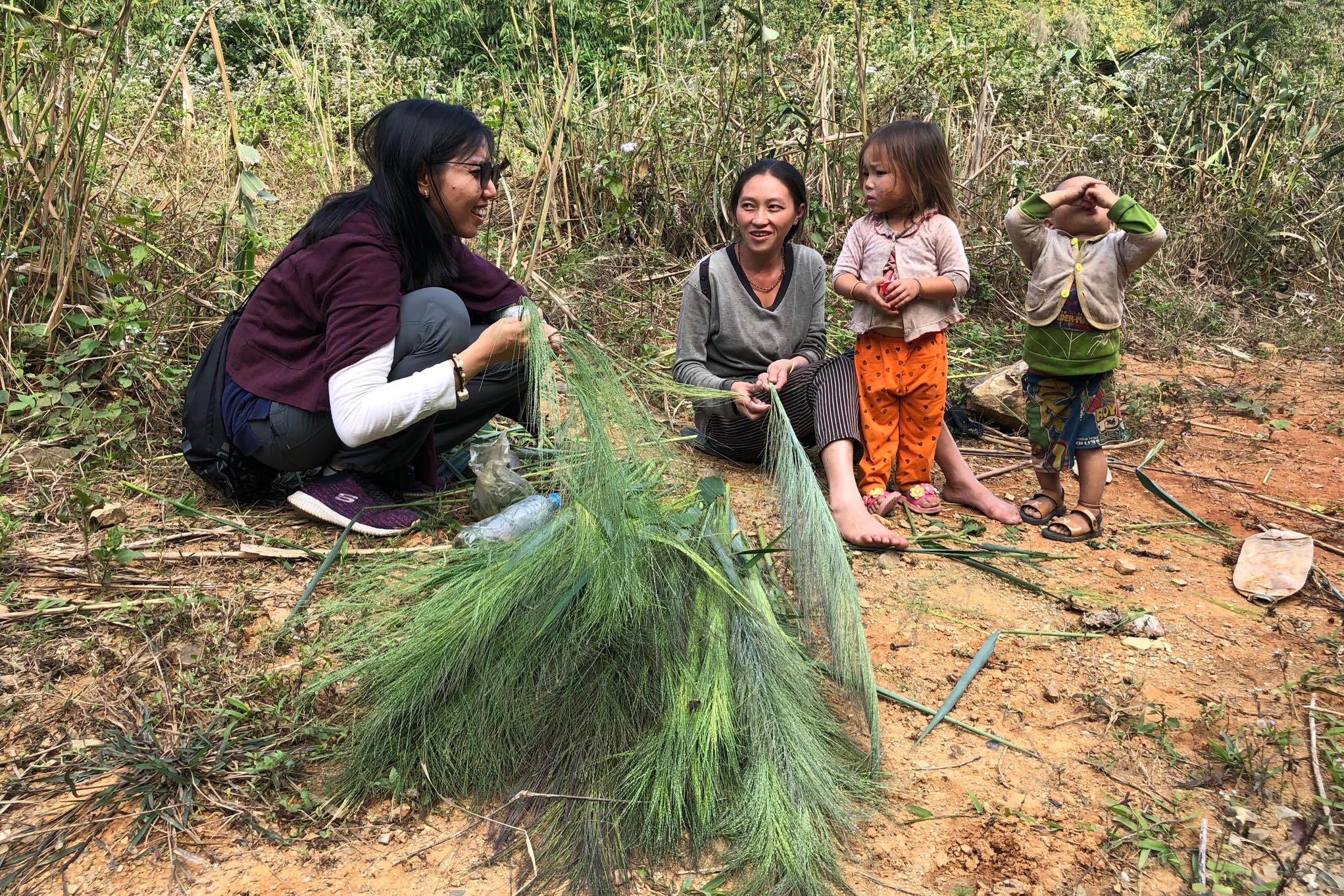
by Chea Seila
I have always depended on nature for my daily life. I need fresh fish to eat, clean water to drink and oxygen to breathe. But after I met and learned from remote communities depending on forests and rivers, I started to understand more deeply about the benefits of natural resources for all kinds of people in different places. I feel good when I work with these people who also love nature. Their livelihoods rely significantly on nature’s resources, such as fish, non-timber forest products, and rivers. They respect and believe in nature and spirits, which is something honest and holy to them. These people live far away from physical infrastructure and any development.
How do I know them? What do natural resources mean to me and to everyone? Who has the power, right, and responsibility to preserve, protect, and conserve these natural resources?
In 2005, I was a volunteer with the Cambodia Volunteer for Society (CVS) Program and was hosted by a local NGO called Culture Environment Preservation Association (CEPA) that has been working to preserve the forest, fish, and water, and conserve the traditional culture of ethnic minority groups in Stung Treng Province. As a volunteer, I had to learn, know and understand about the society, the group of different types of people living together. I applied to learn from a group of people who depend on nature’s resources in a remote area of Stung Treng.
Where was Stung Treng? I did not know. I had never been there. I knew it was located very far from Phnom Penh city. From my imagination, Stung Treng Province where I applied to work might be where people wore traditional customary clothes. They might travel everywhere by elephants, horses and boats. There were not many candidates who wished to apply as a volunteer in Stung Treng.
There were many people who asked me to consider my decision again – even my supervisor and the host NGO asked me to reconsider this decision, since the location was so far away, with not much electricity and clean water. There were few houses that owned generators and others used candles or oil lamps (Changkeang Prengkat) or Chanlos, which are made by dry leaves and resin to light at night time. It was also a hotspot of malaria. However, I was committed to know and see everything with my own eyes rather than hear about it from somebody talking.
Finally, I was selected for the position, and my mission to preserve, protect and conserve natural resources and livelihoods has been continuing until present. I experienced malaria twice when I started to work in Stung Treng, which taught me to how to take care of myself and deal with malaria in the hotspot.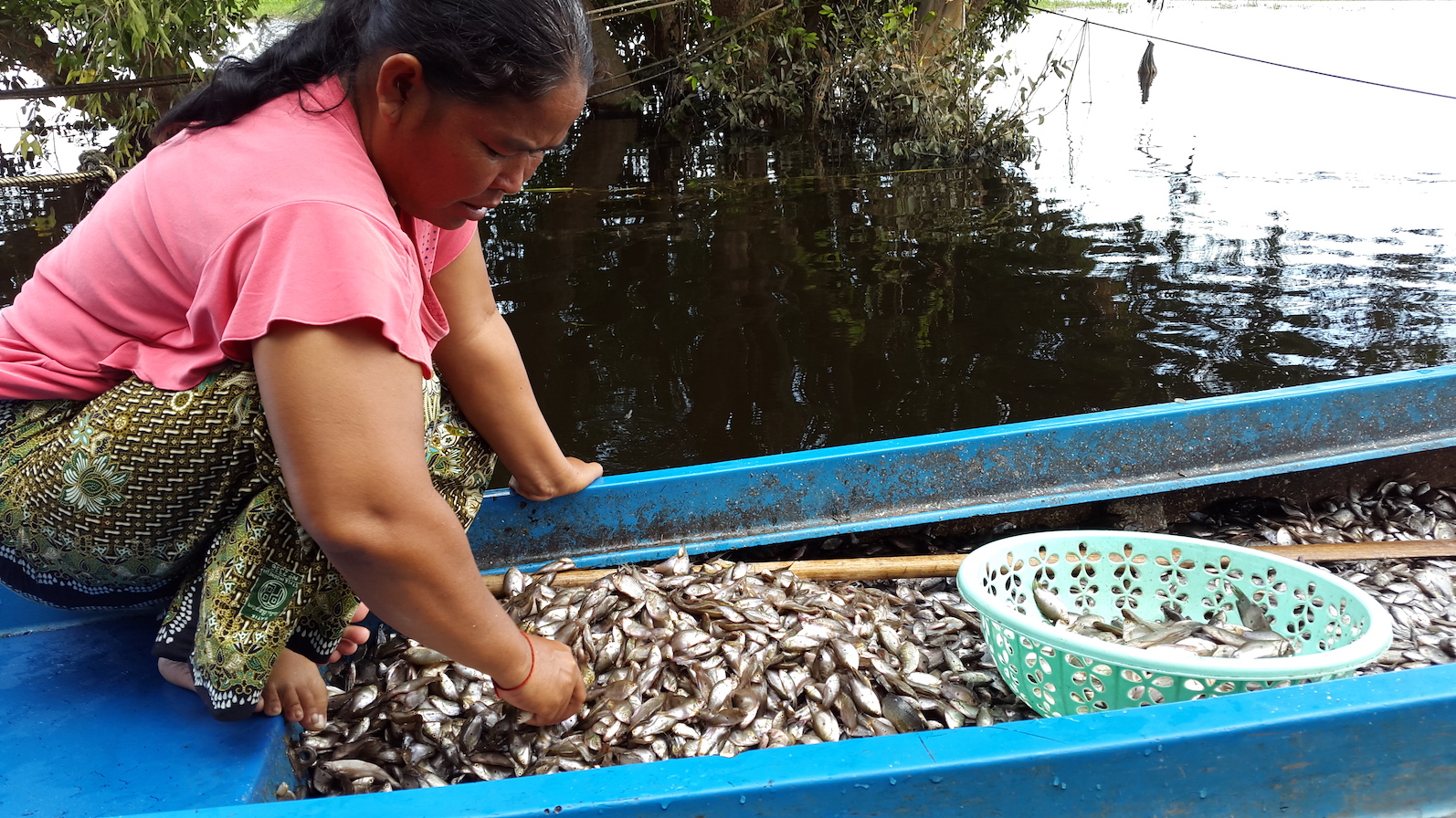
Gender norms in Cambodia have put more pressure on women to not travel far. What is wrong with being a woman? Does being a woman simply mean she has to stay and work close to home and her elders? Do women have to follow all of these expectations? Are all women who work far away from home shameful people, who do not respect elders and traditional culture? Should all women who work far from home be criticized by everyone? Being a woman, why do you have to be adventurous to work far from home?
I felt motivated and proud of my achievements to explore remote communities whose livelihoods heavily depend on natural resources. But I was criticized both directly and indirectly by the people around me. Traditional norms in Cambodia have put more pressure on women by encouraging women to take care of their family, stay close to family, just learn to read and write, get married, have babies, look after children and elders, and cook. A traditional saying that has stopped women moving forward is “Satrey Bangvel Chang Kran Men Chom,” or “Women cannot move beyond the kitchen.”
Even my family and my mother asked me to reconsider when I told them I applied to work as a volunteer in Stung Treng. My mother shared her experiences about when she decided to trade some products from Phnom Penh to sell in Stung Treng when I was 3-4 months old. She was not successful and got malaria at a serious stage. It was a long way to go to Stung Treng with many challenges to face: no road, no bridge, and having to stay in a tent or hammock for a few days to reach Stung Treng. Without income, she spent a large amount of money from home to treat herself at the hospital. She wished I would reconsider my decision again based on her experiences. However, I had decided and understood what I should and shouldn’t do after I had lived in the city for 20 years with a good upbringing and good education from school and parents. I promised my family and myself that I would learn how to live independently out in the world.
My exciting journey to understand society and natural resources began when my parents accompanied me to catch a taxi at 2:30 PM on a day in 2005. I went to Stung Treng with four men who were the project staff of my host organization. Because the road was under construction, we spent almost 12 hours in the car, and sometimes we walked when the car could not move in the mud.
I wanted to change the old way of thinking that women were only objects and weak, who could not move forward without depending on men. I wanted to show that women are not weak, that women have value, willingness, and commitment the same as men do. I am like other women and I have my own dreams. When I was starting to be a volunteer, I did not have a clear direction about what I wanted to be after that. But first of all, I really wanted to leave behind the traditional norms: “women cannot move beyond the kitchen, women cannot go far from home, women cannot work in very difficult situations.”
I wanted to learn about society, understand society, and know Stung Treng and other areas in my home country. I used to study about the Mekong River, Cambodia’s northeastern provinces, ethnicity groups, farmers, forest people, and fishes at school and from books. However, I could not imagine the pictures. In Stung Treng, I was welcomed and taken care of by everybody there. The communities were so friendly. Even though we were from different places, we shared, cared for, and helped each other.
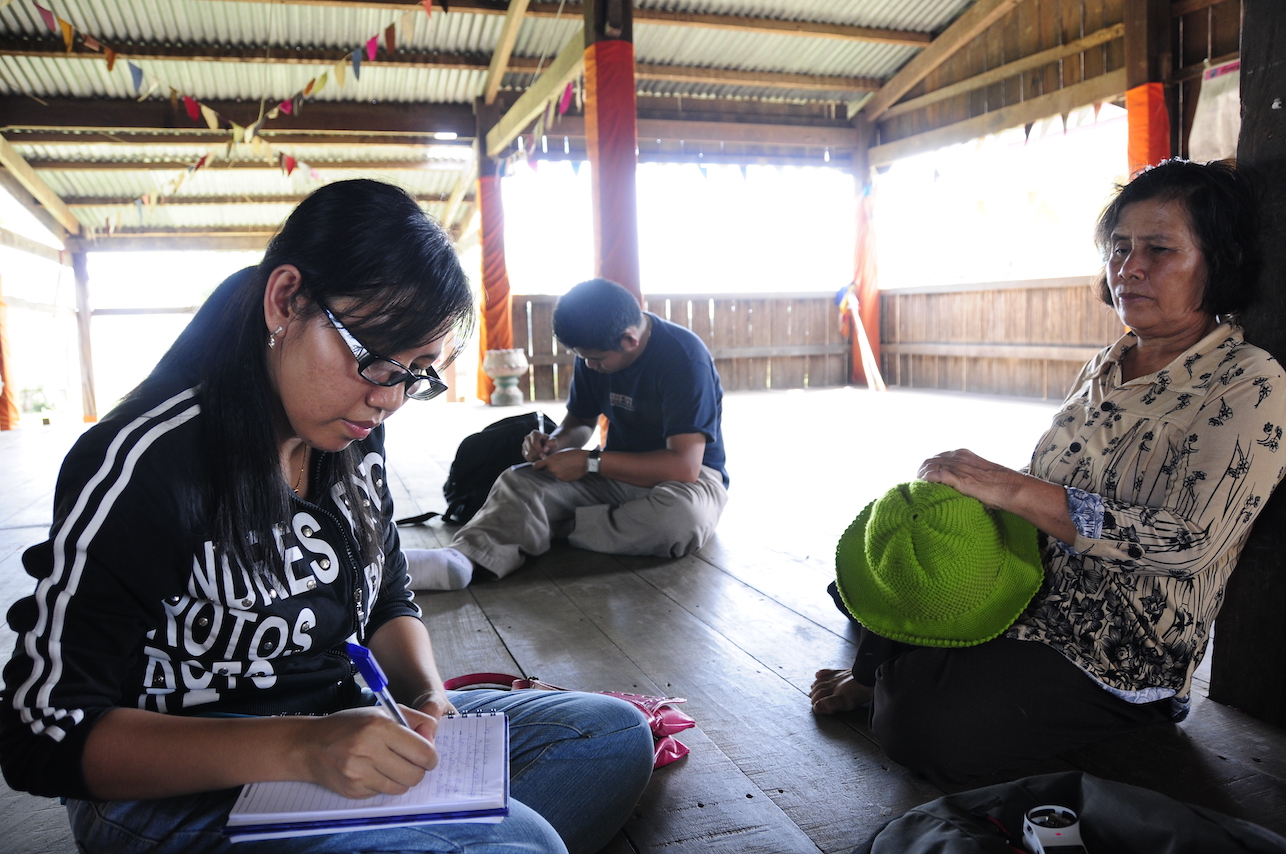
My first assignment was as a volunteer in Water Resources management. I participated with program staff to form community water resource management on the 3S rivers, the Sekong, Sesan and Srepork. Then I became a research assistant in Salaphoum Research to study about fishes, fish habitats, and herbal medicine in four villages in the Stung Treng Ramsar Site. I knew the fish species trey pasee (Mekongina erythrospila—Near Threatened by the IUCN Red list of Threatened species in 2011) was a symbol of this province since its price was once 10,000 KHR/kg ($2.5) and nowadays is 280,000 KHR/kg ($70). Economic value fish species like Pasee have increased once everyone knew about and wanted to taste trey pasee. Fish demand and price go up day by day, while small-scale fish catch for home consumption declines.
As I travelled along the Mekong, Sesan, Sekong, and Srepork rivers, I saw birds, flooded forests, rapids, rock channels, whirl pools, and sand bars. I came to understand the potential of the river and forest. Conducting research on natural resources has taught me to love nature and the environment, and to protect and conserve natural resources unconditionally.
I have observed that outsiders have difficulty understanding or knowing every things that local people know about natural resources. Local people have traditional and local knowledge, even though they did not attend school, do not understand scientific words, have no laboratories, and never recorded their knowledge as words on books. Their local knowledge and wisdom is recorded in their heads and their hearts. Local people know when fish migrate, which fishing gears should be used during each period of time, which plants can be eaten, and which plants can be used for medicine. I really appreciated their local knowledge.
I started to like nature and it inspired me to preserve, protect, conserve and document the local knowledge through pictures, and consolidate data and information for the next generation. The outputs could be used as baseline information key data for developers and decision makers to develop their projects.
Everyone has a role and right to participate in natural resources management. To love yourself, love your family, and love your country, we must use natural resources in a wise and sustainable way. Responsible development can help make both people and the country healthy. Inspiration through exploring living nature and local wisdom motivated a city girl like me to move forward on my mission for sustainable natural resources management. I believe you can do it too.
Chea Seila is a 2018-2019 Mekong Conservation Hero selected by the Wonders of the Mekong project.
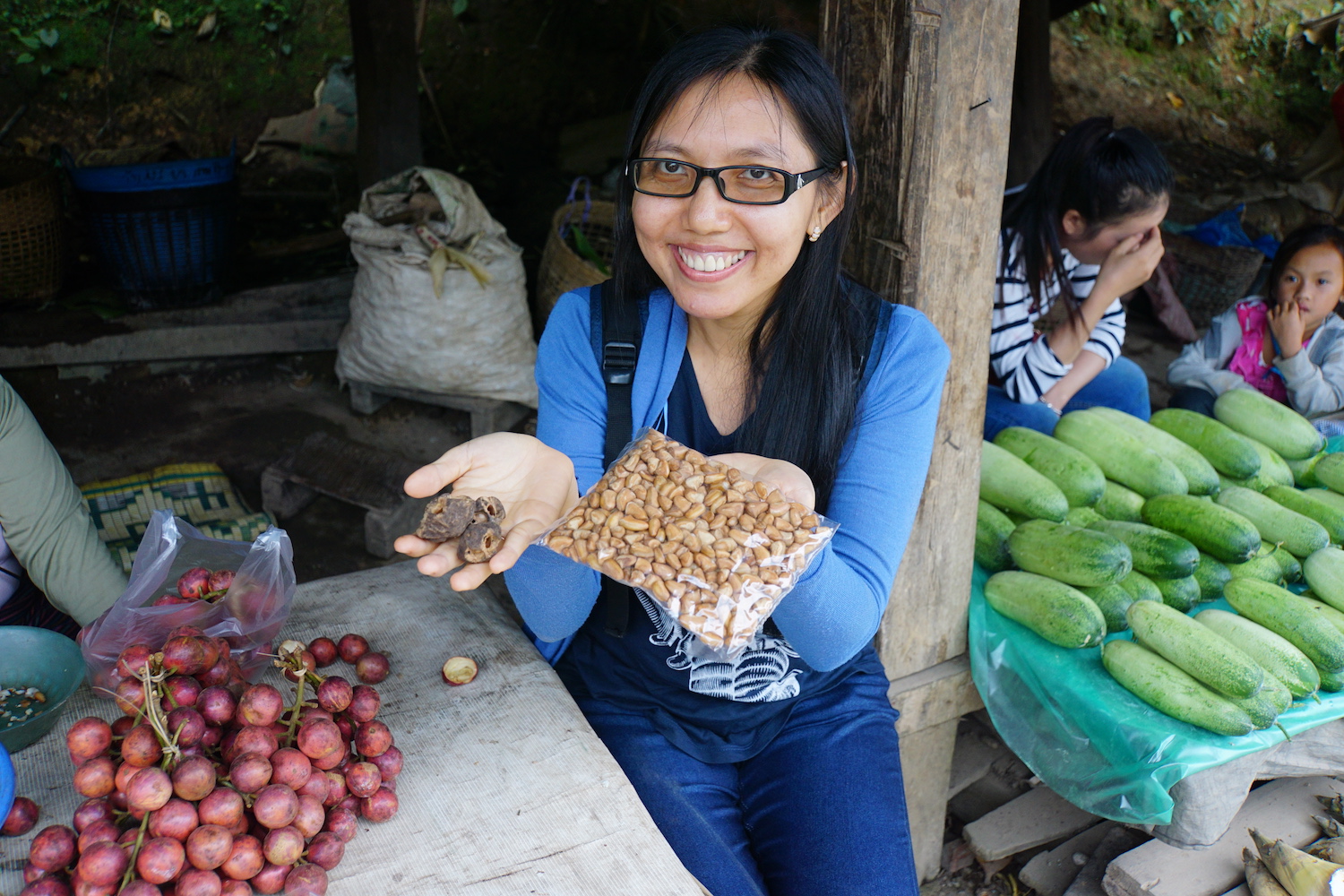
តើការចូលរួមការពារ និងអភិរក្សធនធានធម្មជាតិជាតួនាទីរបស់អ្នកណា?
ដោយ លោកស្រីជា សីលា
បើទោះបីខ្ញុំមិនរស់ពឹងផ្អែកដោយផ្ទាល់ពីធនធានធម្មជាតិក៏ដោយ ក៏ខ្ញុំពឹងផ្អែក និងប្រើប្រាស់ធនធានទាំងអស់នោះ ដោយ ប្រយោលដែរ។ ជាអាទិ៍ ខ្ញុំត្រូវការត្រីសម្រាប់បរិភោគ ទឹកស្អាតសម្រាប់ប្រើប្រាស់ ខ្យល់សម្រាប់ដកដង្ហើម ។ល។ បន្ទាប់ពីបានរៀនរស់នៅជាមួយអ្នកស្រុកព្រៃភ្នំ អ្នកស្រុកទន្លេ និងអ្នកភូមិនៅតាមតំបន់ដាច់ស្រយាល បានធ្វើឲ្យខ្ញុំ ចាប់ផ្តើមមើលឃើញ និងយល់ដឹងកាន់តែច្បាស់ ពីសារៈសំខាន់របស់ធនធានធម្មជាតិ ចំពោះមនុស្សម្នាគ្រប់លំដាប់ថ្នាក់ គ្រប់វណ្ណៈ គ្រប់ពណ៌សម្បុរ និងគ្រប់ទីកន្លែង។ ការរស់នៅជាមួយសហគមន៍តាមតំបន់ព្រៃភ្នំ ទន្លេ បឹងបួរ ដែលមិនមែន ជាសាច់ញាតិគ្រាន់តែជាជនរួមជាតិ ព្រមទាំងអ្នកស្រឡាញ់ធម្មជាតិ គឺមានអារម្មណ៍ស្រស់ស្រាយខ្លាំងណាស់។ អ្នកស្រុក ព្រៃភ្នំ គឺជាក្រុមមនុស្សដែលជីវភាពរស់នៅរបស់ពួកគាត់ពឹងអាស្រ័យទាំងស្រុងទៅលើធនធានធម្មជាតិ ព្រៃព្រឹក្សា ទន្លេ បឹងបួរ ពួកគាត់ប្រកាន់វប្បធម៌ ប្រពៃណី ទំនៀមទម្លាប់ ផ្សារភ្ជាប់ទៅនឹងធនធានធម្មជាតិ ស្មោះត្រង់ បរិសុទ្ធ។ ជាទូទៅ ពួកគាត់តែងតែរស់នៅឆ្ងាយពីហេដ្ឋារចនាសម្ព័ន្ធរូបវន្ត និងការអភិវឌ្ឍន៍នានា។ ហេតុអ្វីបានជាខ្ញុំស្គាល់បងប្អូនអ្នកស្រុក ព្រៃភ្នំ និងជនជាតិដើមភាគតិចទាំងអស់នោះ? តើធនធានធម្មជាតិមានអត្ថន័យបែបណាសម្រាប់ខ្ញុំ និងសម្រាប់អ្នក ទាំងអស់គ្នា? តើជាតួនាទីរបស់អ្នកណាដែលត្រូវចូលរួមថែរក្សា ការពារ និងអភិរក្សធនធានធម្មជាតិទាំងអស់នោះ?
ក្នុងឆ្នាំ២០០៥ ខ្ញុំបានចូលរួមជាអ្នកស្ម័គ្រចិត្ត ក្នុងគម្រោងអ្នកស្ម័គ្រចិត្តកម្ពុជាដើម្បីសង្គម (ហៅកាត់ថា ស៊ីវីអេស)។ ក្នុងនាមជាអ្នកស្ម័គ្រចិត្ត ចំណុចចាប់ផ្តើមដែលខ្ញុំត្រូវធ្វើ គឺការរៀនសូត្រពីការងារ ការរៀនរស់នៅក្នុងសង្គម និងការ ដែលត្រូវស្គាល់សង្គមឲ្យកាន់តែច្បាស់។ តើសង្គមគឺជាអ្វី? ក្នុងន័យនេះ ខ្ញុំចង់បង្ហាញថា សង្គមគឺជាបណ្តុំមនុស្សដែល រស់នៅលាយឡំគ្នា។ ខ្ញុំក៏ជ្រើសរើសការស្វែងយល់ពីសង្គមមនុស្សដែលរស់នៅពឹងអាស្រ័យលើធនធានធម្មជាតិ។ ខ្ញុំបាន សម្រេចចិត្តចូលធ្វើជាអ្នកស្ម័គ្រចិត្តជាមួយអង្គការមិនមែនរដ្ឋាភិបាលមួយ (សមាគមថែរក្សាបរិស្ថាន និងវប្បធម៌ ហៅកាត់ ថា អង្គការ សេប៉ា) ដែលធ្វើការលើផ្នែកថែរក្សាការពារធនធានធម្មជាតិ ទឹក ត្រី ព្រៃឈើ និងអភិរក្សវប្បធម៌ ជនជាតិ ដើមភាគតិច នៅខេត្តស្ទឹងត្រែង។
តើខេត្តស្ទឹងត្រែងនៅឯណា? ខ្ញុំក៏មិនដឹងទេ ហើយមិនធ្លាប់បានទៅដល់ មិនធ្លាប់ស្គាល់ បានតែត្រឹមដឹងថាវានៅឆ្ងាយ ណាស់ប៉ុណ្ណោះ។ បើតាមការស្រមើស្រមៃរបស់ខ្ញុំ ខេត្តស្ទឹងត្រែង ប្រហែលមានតែមនុស្សស្លៀកពាក់តែខោអាវប៉ឹង (ខោអាវជនជាតិ) ជិះដំរី ជិះសេះ ជិះទូកធ្វើដំណើរទៅទីជិតឆ្ងាយហើយមើល៍ទៅ…។ អំឡុងពេលប្រកួតប្រជែង ដាក់ពាក្យ ធ្វើជាអ្នកស្ម័គ្រចិត្តនៅខេត្តស្ទឹងត្រែង មិនមានបេក្ខជនច្រើននាក់ទេដែលមានចំណាប់អារម្មណ៍ចង់ទៅធ្វើការនៅខេត្តដាច់ ស្រយាលមួយនេះ។ មានមនុស្សជាច្រើនបានស្តីបន្ទោស និងបានប្រាប់ឲ្យខ្ញុំគិតសារឡើងវិញម្តងទៀត សូម្បីតែអ្នក គ្រប់គ្រងកម្មវិធី ព្រមទាំងអ្នកស្រីអនុប្រធានអង្គការ ដែលសម្ភាសន៍ខ្ញុំ ក៏បានសួរបញ្ជាក់ខ្ញុំដដែលៗ ម្តងហើយម្តងទៀត ព្រោះគាត់គិតថា ខ្ញុំជាមនុស្សស្រី ដែលធ្លាប់តែរស់នៅក្នុងទីក្រុងភ្នំពេញ មិនអាចទៅធ្វើការនៅខេត្តដាច់ស្រយាល បានឡើយ។ គាត់បានសង្កត់ធ្ងន់ថា នៅទីនោះមិនទាន់មានភ្លើងអគ្គិសនីប្រើប្រាស់គ្រប់គ្រាន់ទេ គឺមានភ្លើងប្រើត្រឹម តែពីម៉ោង…ដល់ម៉ោង៩យប់ប៉ុណ្ណោះ។ មានផ្ទះតិចតួចប៉ុណ្ណោះ ដែលមានម៉ាស៊ីនភ្លើងប្រើដោយខ្លួនឯង។ ក្រៅពីនោះគឺ ប្រើចង្កៀងប្រេងកាត ដុតទៀន ឬ ដុតចន្លុះបំភ្លឺជាដើម។ ចំណែកឯទឹកស្អាតក៏មិនមានគ្រប់គ្រាន់សម្រាប់ប្រើប្រាស់ដែរ។ ម្យ៉ាងទៀត អាចប្រឈមនឹងជំងឺគ្រុនចាញ់ទៀតផង។ ទោះយ៉ាងណា ខ្ញុំបានតាំងចិត្តហើយថា នឹងទៅស្គាល់ និងឃើញ នឹងភ្នែកឲ្យបានច្រើន ជាជាងឮគេថា។ ដោយសារការតាំងចិត្តយ៉ាងមោះមុត ទីបំផុត ខ្ញុំទទួលបានការងារ នៅទីនោះ ផ្នែកការគ្រប់គ្រងធនធានធម្មជាតិ។
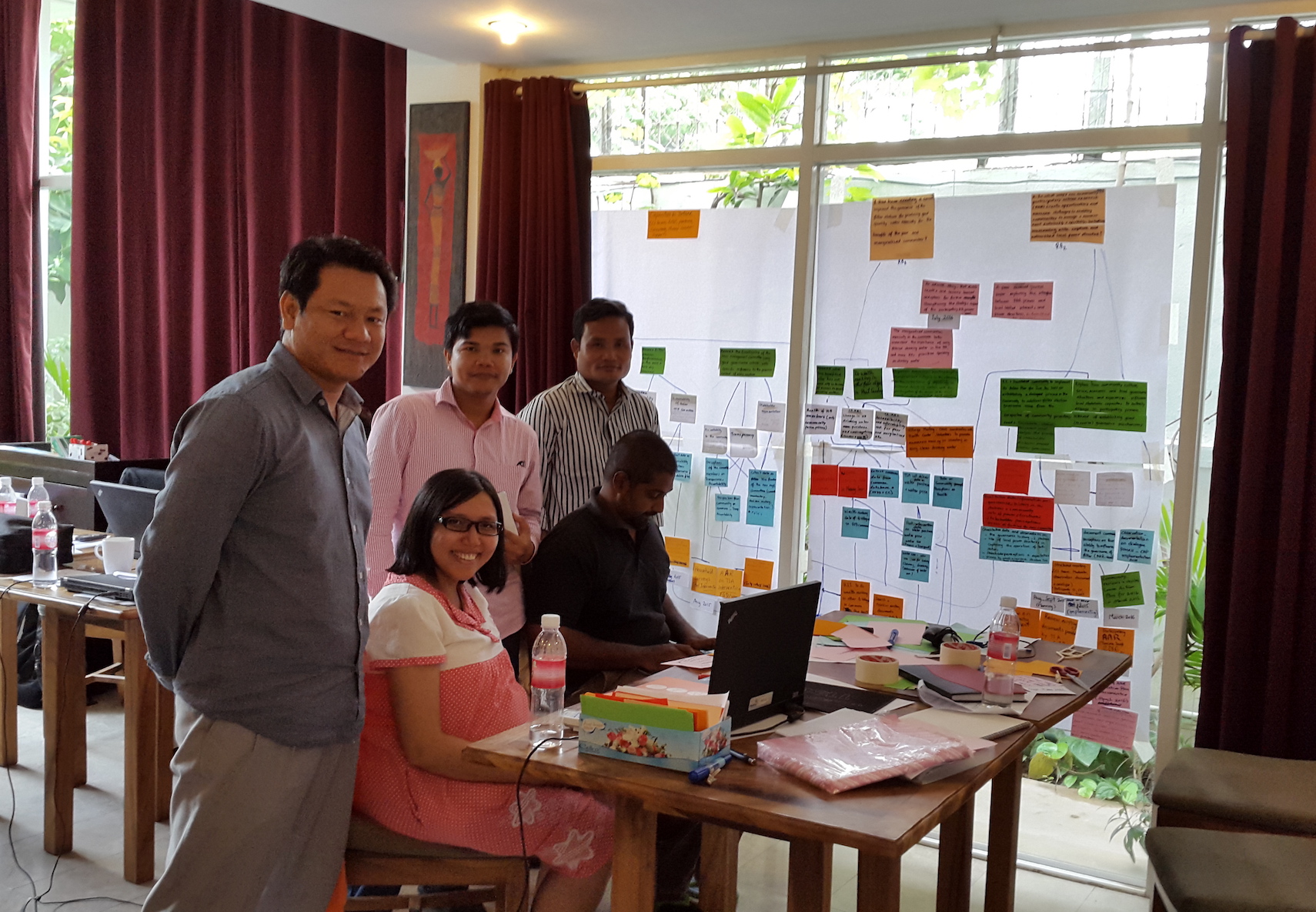
បញ្ហាយេនឌ័រ និងទំនៀមទំលាប់ប្រពៃណីនៅក្នុងប្រទេសកម្ពុជាបានកំណត់ព្រំដែនស្ត្រីមិនអោយដើរឆ្ងាយពីក្រុមគ្រួសារ។ តើខ្លួនជាស្រីវាយ៉ាងម៉េច? ខ្លួនជាស្រីគួររស់នៅ និងធ្វើការក្បែរផ្ទះ ក្បែរចាស់ទុំឬ? តើទាំងអស់នេះជាបញ្ហាដែលមនុស្ស ស្រីគួរតែប្រតិបត្តិតាមឬ? តើស្ត្រីដែលធ្វើការងារឆ្ងាយពីគ្រួសារ សុទ្ធតែជាស្រីមិនល្អ មិនគោរពចាស់ទុំឬ? តើស្ត្រីដែល ធ្វើការឆ្ងាយពីគ្រួសារត្រូវតែទទួលរងការត្មះតិដៀល និងពាក្យរិះគន់ពីមនុស្សម្នាឬ? ជាតិជាស្ត្រី តើចាំបាច់អីទៅ ដែលត្រូវ ទៅផ្សងព្រេងធ្វើការងារឆ្ងាយពីផ្ទះបែបនេះ?
ផ្ទុយពីការសាទរ និងមានមោទនៈចំពោះជោគជ័យដែលខ្ញុំទទួលបាន ខ្ញុំបែរជាទទួលបាននូវពាក្យរិះគន់ជាច្រើនពីមនុស្ស នៅជុំវិញខ្លួន។ ប៉ុន្តែ សួរថា តើមនុស្សស្រីវាយ៉ាងម៉េច ហេតុអ្វីចាំបាច់រស់ និងធ្វើការជិតផ្ទះ? ឬអ្នកទាំងអស់នោះគិតថា ស្ត្រីបង្វិលចង្ក្រានមិនជុំ? ហេតុអ្វីត្រូវបន្តុះបង្អាប់ស្ត្រី? ឬក៏គិតថា ស្ត្រីគ្រាន់ជាភេទទន់ខ្សោយ រៀនសូត្រចេះដឹងតិចតួច បានហើយ រួចរៀបការ បង្កើតកូន នៅផ្ទះ ថែទាំផ្ទះ មើលថែទាំប្តី និងកូនឬយ៉ាងណា?
ម្តាយខ្ញុំធ្លាប់ប្រាប់ខ្ញុំថា គាត់ធ្លាប់ទៅលក់ដូរឥវ៉ាន់ជាមួយបងប្អូន នៅខេត្តស្ទឹងត្រែង ក្នុងពេលខ្ញុំមានអាយុត្រឹមតែ ៣ទៅ៤ខែ។ ប៉ុន្តែគាត់មិនទទួលបានជោគជ័យទេហើយគាត់ក៏វិលត្រឡប់មកភ្នំពេញវិញជាមួយជំងឺគ្រុនចាញ់ ដំណាក់កាលធ្ងន់ធ្ងរជាប់ខ្លួនផងដែរ។ គាត់បានប្រាប់ខ្ញុំថា គាត់ត្រូវជិះកាណូត ជិះឡាន ពីរបីដំណាក់ ដោយសម្រាកនៅក្នុងអង្រឹង ចងក្រោមឡានដឹកទំនិញធំៗ ឬ តាមតង់ជាច្រើនថ្ងៃ ជាមួយអ្នកដំណើរដទៃទៀត ទំរាំទៅដល់ខេត្តស្ទឹងត្រែង។ ការធ្វើ ដំណើរទៅខេត្តនេះ ត្រូវឆ្លងកាត់អូរជាច្រើន ហើយតាមអូរនិមួយៗមិនមានស្ពានទេ ពេលមានភ្លៀងធ្លាក់មក គឺទឹកជន់ លិចអូរភ្លាម ឡានមិនអាចឆ្លងអូរទៅម្ខាងទៀតបានទេ។ មកដល់ផ្ទះ ម្តាយខ្ញុំត្រូវទៅសម្រាកនៅពេទ្យអស់ជាច្រើនសប្តាហ៍ ទម្រាំជាសះស្បើយឡើងវិញ។ គាត់មិនទទួលបានប្រាក់ចំណេញពីការទៅលក់ដូរនៅស្ទឹងត្រែងទេ ផ្ទុយទៅវិញត្រូវ ចំណាយប្រាក់ថែទាំជំងឺថែមទៀត។ បទពិសោធន៍ទាំងនេះហើយ ដែលគាត់ចង់ឲ្យខ្ញុំគិតសារឡើងវិញ។ ខ្ញុំបានលើក ហេតុផលជាច្រើន ដើម្បីពន្យល់អ្នកផ្ទះរបស់ខ្ញុំ ដើម្បីបញ្ចុះបញ្ចូលគាត់ឲ្យគាំទ្រនូវការសម្រេចចិត្តរបស់ខ្ញុំក្នុងការផ្សងព្រេង ទៅធ្វើការនៅខេត្តស្ទឹងត្រែង។ ក្នុងនោះខ្ញុំបានបង្ហាញពីឆន្ទៈ ការតាំងចិត្ត និងការសន្យាចំពោះពួកគាត់ និងខ្លួនឯងថា ខ្ញុំនឹងនៅតែស្ថិតក្នុងការគ្រប់គ្រង និងការមើលថែ ការប្រៀនប្រដៅរបស់គាត់ ព្រមទាំងមិនភ្លេចនូវភាពកក់ក្តៅនៅក្នុង គ្រួសារ និងការរស់នៅយ៉ាងសុខស្រួលនៅទីក្រុងភ្នំពេញជិត២០ឆ្នាំកន្លងមកនេះ និងយល់បានយ៉ាងច្បាស់ពីទង្វើល្អ និង អាក្រក់ ដូច្នេះ ពេលនេះ គឺជាពេលវេលាដែលខ្ញុំគួររៀនរស់នៅដោយម្ចាស់ការលើខ្លួនឯង ក្នុងសង្គមដ៏ធំធេងមួយនេះ។
ក្រោយពីបានព្រមព្រៀងគ្នាហើយ ប៉ុន្មានថ្ងៃក្រោយមក នាម៉ោង២ និង៣០នាទី ទាបភ្លឺ ក្នុងឆ្នាំ២០០៥ លោកឪពុក និងអ្នកម្តាយរបស់ខ្ញុំ បានដឹកខ្ញុំតាមម៉ូតូ ដោយមានវ៉ាលីសដ៏ធំមកជាមួយផង សំដៅទៅចំណតរថយន្តឈ្នួល ភ្នំពេញ-ខេត្តស្ទឹងត្រែង។ នោះគឺជាដំណើរផ្សងព្រេងលើកទីមួយរបស់ខ្ញុំ ទៅកាន់ខេត្តស្ទឹងត្រែង។ នៅក្នុងរថយន្តឈ្មួល ខ្ញុំត្រូវធ្វើដំណើរជាមួយមានបុរស៤នាក់ ដែលជាបុគ្គលិករបស់អង្គការ ដែលខ្ញុំនឹងត្រូវធ្វើការជាមួយពួកគាត់។ ដោយសារ ផ្លូវលំបាក ពួកយើងត្រូវចំណាយពេលជាង១២ម៉ោង។ តាមបណ្តោយផ្លូវ កន្លែងខ្លះយើងត្រូវចុះដើរផង ដើម្បីឲ្យរថយន្ត ឆ្លងផុតឧបសគ្គងាយស្រួលក៏មាន។ ប៉ុន្តែ ទោះយ៉ាងណា អារម្មណ៍របស់ខ្ញុំនៅតែរំភើបណាស់ មិនអាចបរិយាយបាន។
ខ្ញុំចង់ផ្លាស់ប្តូរផ្នត់គំនិតចាស់គំរិលដែលមើលឃើញស្ត្រី គ្រាន់ជាគ្រឿងលម្អ ជាភេទទន់ខ្សោយមិនអាចធ្វើអ្វីក្រៅតែពីពឹង កម្លាំងមនុស្សប្រុសនោះ។ ខ្ញុំចង់បង្ហាញថា ស្ត្រីមិនទន់ខ្សោយទេ ស្ត្រីមានគុណតម្លៃរបស់ខ្លួន មានឆន្ទៈ និងការតាំង ចិត្តខ្ពស់ដូចជាមនុស្សប្រុសដែរ។ ខ្ញុំក៏ដូចជាស្ត្រីដទៃទៀតដែរ គឺមានក្តីស្រមៃរបស់ខ្លួនឯង។ ប៉ុន្តែនៅពេលចាប់ផ្តើម ការងារដំបូង ខ្ញុំក៏នៅមិនទាន់មានភាពច្បាស់លាស់ពីទិសដៅទៅអនាគតទេថា ខ្ញុំចង់ធ្វើអ្វី។ អ្វីដែលខ្ញុំចង់ធ្វើ និងកែប្រែ ខ្លួនឯងនាពេលនោះគឺចង់ចាកចេញពីពាក្យថា «ស្ត្រីបង្វិលចង្ក្រានមិនជុំ» និង «ស្ត្រីមិនអាចធ្វើដំណើរឆ្ងាយពីផ្ទះ» ឬ «ស្ត្រី មិនអាចធ្វើការនៅក្នុងកាលៈទេសៈលំបាកលំបិនបានឡើយ»។ ខ្ញុំចង់រៀនពីសង្គម ខ្ញុំចង់ស្គាល់សង្គម ខ្ញុំចង់ស្គាល់ ខេត្តស្ទឹងត្រែង និងតំបន់នានានៅក្នុងប្រទេសកំណើតរបស់ខ្ញុំ។ ខ្ញុំធ្លាប់រៀនពីទន្លេមេគង្គ ខេត្តភូមិភាគឦសាន ជនជាតិដើមភាគតិច អ្នកស្រែ អ្នកព្រៃភ្នំ ប្រភេទត្រីមួយចំនួន តាមរយៈការអានសៀវភៅ។ យ៉ាងណាវិញ ខ្ញុំនៅតែ មិនអាចគិតស្រមៃពីរូបភាពទាំងនោះចេញដដែល រហូតខ្ញុំបានមកឃើញវាដោយផ្ទាល់ភ្នែកខ្ញុំ។
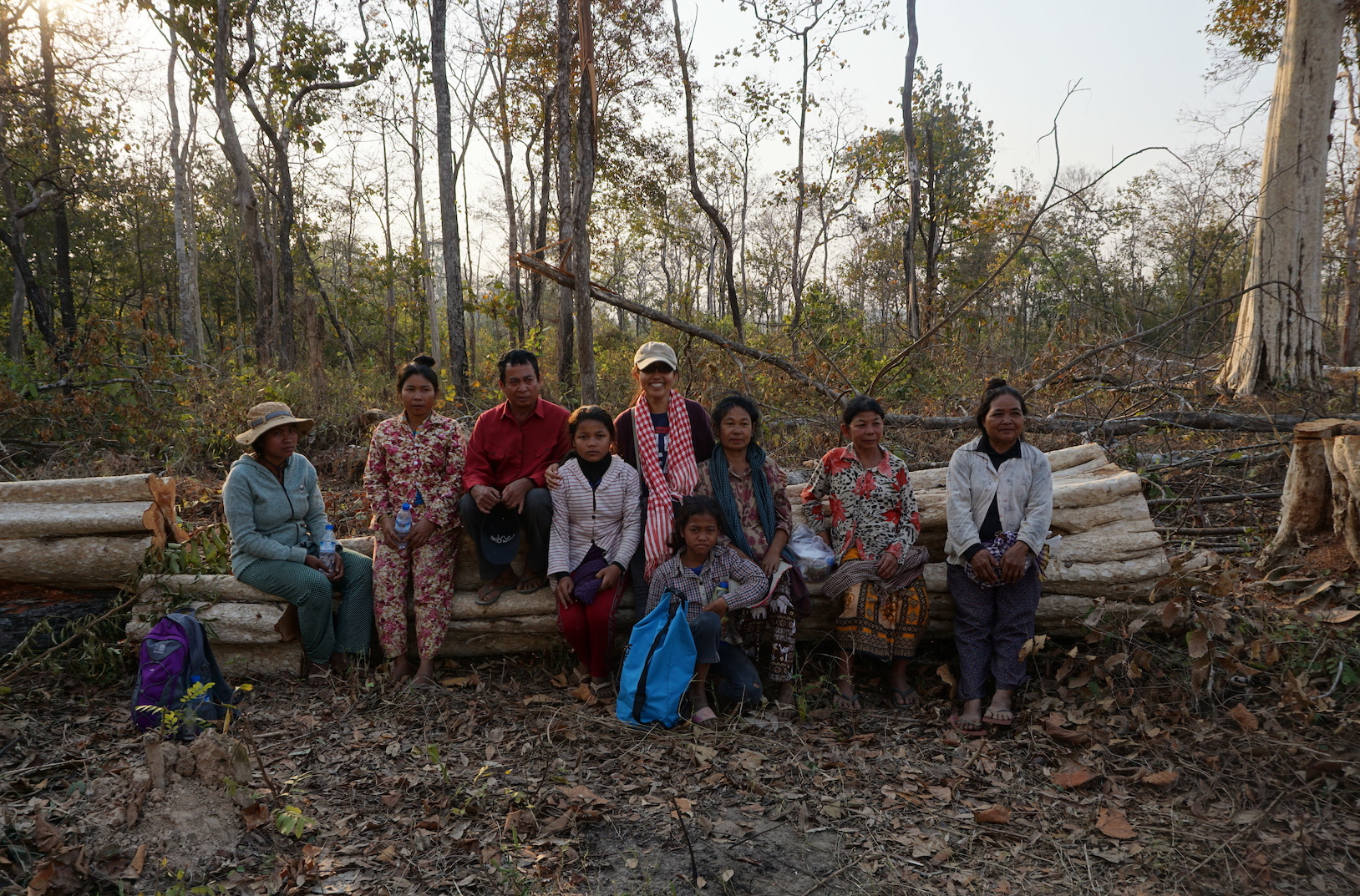
នៅស្ទឹងត្រែង ទីដែលខ្ញុំដំណើរពីភ្នំពេញមកផ្សងព្រេងនោះ ខ្ញុំបានទទួលបានការរាក់ទាក់ និងគោរពរាប់អានពីរាមច្បង ព្រមទាំងចាស់ទុំទាំងអស់ ដែលខ្ញុំត្រូវធ្វើការងារ និងរស់នៅជាមួយពួកគាត់ ក្នុងតំបន់ដែលយើងត្រូវធ្វើការងារនោះ។ ពួកគាត់ផ្តល់ភាពកក់ក្តៅ មើលថែខ្ញុំ ដូចជាសាច់ញាតិរបស់ពួកគាត់ដែរ។ ពួកយើងសុទ្ធតែមកពីកន្លែងផ្សេងគ្នា មកធ្វើការ នៅតំបន់ដាច់ស្រយ៉ាលដូចគ្នា ដូច្នេះពួកយើងត្រូវយកអាសារគ្នា ដូចពាក្យចាស់លោកពោលថា៖ «នៅផ្ទះម្តាយទីទៃ នៅព្រៃម្តាយជាមួយគ្នា»។
ការងារដំបូងរបស់ខ្ញុំ ក្នុងនាមជាអ្នកស្ម័គ្រចិត្ត ក្នុងគម្រោងការគ្រប់គ្រងធនធានទឹក។ ខ្ញុំបានចូលរួមសម្របសម្រួល ជាមួយក្រុមការងារ ក្នុងការបង្កើតសហគមន៍គ្រប់គ្រងធនធានទឹក តាមទន្លេបីក្នុងខេត្តស្ទឹងត្រែង គឺទន្លេសេកុង សេសាន និងទន្លេស្រែពក ដើម្បីចងក្រង និងស្វែងយល់ពីបំរែបំរួលរបបទឹក និងធនធានក្នុងទន្លេ។ល។ បន្ទាប់មកខ្ញុំ បានចូលរួម ជាជំនួយការអ្នកស្រាវជ្រាវនៃគម្រោងសាលាភូមិ ដែលសិក្សាពីធនធានត្រី ជម្រកត្រី រុក្ខជាតិជាឱសថបុរាណ នៅក្នុង ភូមិគោលដៅចំនួន៤កន្លែងតាមតំបន់រ៉ាមសារខេត្តស្ទឹងត្រែង។ ខ្ញុំបានស្គាល់ ត្រីប៉ាសេអ៊ី ដែលជាត្រីប្រចាំខេត្តស្ទឹងត្រែង។ តាំងពីវាមាន តម្លៃត្រឹម១០,០០០៛ តែដល់ពេលនេះវាមានតម្លៃរហូតដល់ ២៨០,០០០៛ ក្នុងមួយគីឡូក្រាមហើយ។ ប្រភេទត្រី ដែលមានតម្លៃសេដ្ឋកិច្ច ក៏កាន់តែចាប់បានតិចទៅៗ នៅពេលមានគេស្គាល់វាច្រើន មានតម្រូវការច្រើន និង មានតម្លៃសេដ្ឋកិច្ចកាន់តែខ្ពស់។ ខ្ញុំបានឃើញ វត្តមានសត្វស្លាប ព្រៃលិចទឹក ជួរថ្ម ថ្មប៉ប្រះទឹក ទឹកវិល ទឹកកួច កោះខ្សាច់ តូចធំតាមក្នុងទន្លេទាំងបួនគឺទន្លេមេគង្គ សេកុង សេសាន និងស្រែពក។ ខ្ញុំមើលឃើញសក្តានុពលទន្លេ និងព្រៃព្រឹក្សា នៅក្នុងតំបន់ និងជុំវិញតំបន់នោះ បានកាន់តែច្រើន។ ការងារសិក្សាស្រាវជ្រាវ គឺបានបណ្តុះស្មារតីឲ្យខ្ញុំស្រលាញ់បរិស្ថាន ចូលរួមចំណែកថែរក្សា ការពារ អភិរក្សធនធានធម្មជាតិដោយគ្មានហ្មងសៅតាមលទ្ធភាព និងសមត្ថភាពដែលអាច ធ្វើបាន និងចូលរួមលើកកម្ពស់ការអភិវឌ្ឍន៍ប្រកបដោយចីរភាព។ បេសកកម្មរបស់ខ្ញុំចំពោះការងារគ្រប់គ្រងធនធាន ធម្មជាតិ និងរបរចិញ្ចឹមជីវិតរបស់សហគមន៍តាមដងទន្លេ គឺបន្តរហូតដល់ពេលបច្ចុប្បន្ននេះ។ ក្នុងអំឡុងពេល២ឆ្នាំដំបូង ខ្ញុំបានកើតជំងឺគ្រុនចាញ់ ចំនួន២ដងផងដែរ ដែលទាមទារអោយខ្ញុំត្រូវចេះថែរក្សាខ្លួនបន្ថែមក្នុងពេលចុះធ្វើការតាម តំបន់ដែលងាយកើតជំងឺគ្រុនចាញ់។
ក្រោយពេលចូលរួមក្នុងការសិក្សាស្រាវជ្រាវបានមួយរយៈ ខ្ញុំបានសង្កេតឃើញថា អ្នកមកពីខាងក្រៅ មិនអាចចេះ និង យល់ច្បាស់ជាងអ្នកនៅក្នុងតំបន់ទេ បើនិយាយពីធនធានធម្មជាតិ។ មនុស្សរស់នៅក្នុងមូលដ្ឋាន ពួកគាត់យល់ដឹងជ្រៅ ជ្រះណាស់ អំពីចំណេះដឹងមូលដ្ឋាន បើទោះបីគាត់មិនចេះពីភាសាវិទ្យាសាស្ត្រ មិនចេះពិសោធន៍ មិនមានមន្ទីរពិសោធន៍ និងចេះតែកត់ត្រាទុកអ្វីៗគ្រប់យ៉ាង គឺស្ថិតនៅក្នុងខួរក្បាលរបស់គាត់ប៉ុណ្ណោះ។ ជាក់ស្តែង អ្នកមកពីខាងក្រៅតំបន់ មិនអាចមានចំណេះចេះដឹងច្រើនជាងពួកគាត់ទេ។ ពួកគាត់អាចដឹងថា ក្នុងអន្លង់នីមួយៗមានប្រភេទត្រីអ្វីខ្លះ។ ត្រីឡើង ចុះនៅខែណា។ ខែណាប្រើឧបករណ៍អ្វី។ រុក្ខជាតិណាអាចហូបបាន។ រុក្ខជាតិណាជាថ្នាំ។ កន្លែងណាសម្បូរត្រី ប្រភេទណា។ល។ ខ្ញុំពិតជាកោតសរសើរពួកគាត់ណាស់។ អ្វីៗទាំងអស់នេះ វាពិតជាធ្វើអោយខ្ញុំចូលចិត្ត ហើយចាប់ផ្តើម មានគំនិតថែរក្សា ការពារ អភិរក្ស និងចងក្រងចំណេះដឹងរបស់ពួកគាត់ តាមរយៈការផ្តិតយករូបភាព និងការចងក្រង ជាឯកសារទុកសម្រាប់កូនចៅជំនាន់ក្រោយ និងសម្រាប់អ្នកធ្វើផែនការ និងអ្នកសម្រេចចិត្ត ដើម្បីយកមកប្រើប្រាស់ ជាព័ត៌មានគោល ក្នុងការធ្វើសេចក្តីសម្រេចចំពោះការអភិវឌ្ឍន៍នានា។
មនុស្សគ្រប់រូបមានតួនាទី និងសិទ្ធិក្នុងការចូលរួមថែរក្សា ការពារ និងអភិរក្សធនធានធម្មជាតិ។ ស្រឡាញ់ខ្លួនអ្នក ស្រឡាញ់គ្រួសាររបស់អ្នក ស្រឡាញ់ប្រទេសរបស់អ្នក ស្រឡាញ់ពិភពលោកមួយនេះ គប្បីចូលរួមថែរក្សា ការពារ អភិរក្ស ដើម្បីឲ្យការប្រើប្រាស់ធនធានធម្មជាតិបានយូរអង្វែង។ ការអភិវឌ្ឍន៍ប្រកបដោយការទទួលខុសត្រូវ នាំឲ្យអនាគតអ្នក និងប្រទេសជាតិទាំងមូលរបស់អ្នក មានសុខភាពល្អ និងរីកចំរើនថ្កើងថ្កាន។ ការស្វែងយល់ពីធនធានធម្មជាតិ និងសេវាកម្មរបស់វា និងចំណេះដឹងរបស់ប្រជាជនមូលដ្ឋានបានធ្វើអោយស្ត្រីទីក្រុងម្នាក់បន្តបេសកកម្មនានាក្នុងការ គ្រប់គ្រងធនធានធម្មជាតិរបស់ដូនតាយើងអោយស្ថេរភាពសំរាប់កូនចៅជំនាន់ក្រោយ។ ខ្ញុំជឿថាអ្នកក៏អាចធ្វើបាន។
លោកស្រី ជា សីលា គឺជាបុគ្គលឆ្នើម ប្រចាំឆ្នាំ២០១៨ -២០១៩ ក្នុងការអភិរក្សតំបន់ទន្លេមេគង្គដែលបានជ្រើសរើសដោយ គម្រោងអច្ឆរិយភាពនៃទន្លេមេគង្គ។